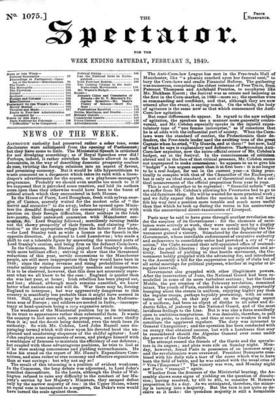NEWS OF THE WEEK.
ALTHOUGH curiosity had preserved rather a sober tone, some disclosures were anticipated from the opening of Parliament; but they have come to little. The Ministerial Speech is criticized for not divulging something; as if Royal Speeches ever did ! Perhaps, indeed, it rather stretches the licence allowed to such documents, in the way of describing domestic prosperity couleur de rose, twisting the foreign relations into an aspect of favour, and promising economy. But it would be idle hypercriticism to waste comment on a dociunent which takes its rank with a linen- draper's advertisement for the season, or a playhouse-manager's programme. Probably we should even ascribe too much to it if we supposed that it provoked some reaction, and laid its authors more open than they otherwise would have been to the burst of critical attack which they encountered in both Houses.
In the House of Peers, Lord Brougham, fresh with sylvan ener- gies of Cannes, scarcely waited for the modest echo of " the mover and seconder" to die away, before he opened upon Minis- ters the dreadful floodgates of his commentary ; dilating with unction on their foreign difficulties, their mishaps in the Irish law-courts, their untoward connexion with Manchester eco- nomics, &c. Lord Stanley followed ; mercilessly turning inside out the showy prosperity of their Speech, and claiming "pro- tection" as the appropriate refuge from the failure of free trade, —for Lord Stanley took as wide a licence as the Speech in the opposite direction. A godsend to Lord Lansdowne ; who made a shift to cut a tolerable figure by answering the unsound parts of Lord Stanley's oration, and being firm on the defunct Corn-laws. In the Commons, Mr. Disraeli played Lord Stanley's double, with more brilliant effect ; striving to show that the threatened reductions of this year, servile concessions to the Manchester people, are still more inappropriate than they would have been in 1848; since the rising revenue and rising probabilities of war render military reductions peculiarly needless and inopportune. It is to be observed, however, that this does not accurately repre- sent what we all know to be the case : England is quieter than she was last year, at home ; Irish rebellion has been played out, and lost ; abroad, although much remains unsettled, we know better what nations can and will do. War there may be, forcing England to interpose ; but war aggressively dangerous to this country is manifestly less probable than it might have seemed in 1848. Still, naval strength may be demanded in the Mediterra- nean seas of Europe ; and soldiers are needed in India,—incompe- tency at head-quarters being a very expensive article. The weakness of the Ministerial position lay in its trimming, in its trust to appearances rather than substantial facts. It wants the country to look more safe, more prosperous, and more thrifty than it is; and the deceit being detected, even the truth loses its authority. So with Mr. Cobden, Lord John Russell uses dis- paraging terms,! which will draw upon his devoted head the un- adorned and unadorning eloquence of the skilful agitator : Lord John employs some arguments of sense, and pledges himself with a semblance of firmness to maintain the efficiency of our defences ; but coupled with those advantageous positions, he tries to look as if he were making concessions and yielding retrenchments. He takes his stand on the report of Mr. Hume's Expenditure Com- mittees, and aims rather at true economy and effective organization than at vast savings : but why not say so? The result of this trimming is a position of evident weakness. In the Commons, the long debate was adjourned, to Lord John's manifest discomfiture. In the Lords, although the Duke of Wel- lington refused to raise any difficulty to the conduct of her Ma- jesty's service by her Majesty's Ministers, they escaped defeat only by the narrow majority of trvo : in the Upper House, where an equal vote is tantamount to a negative, the Duke's vote would have turned the scale against them.


























